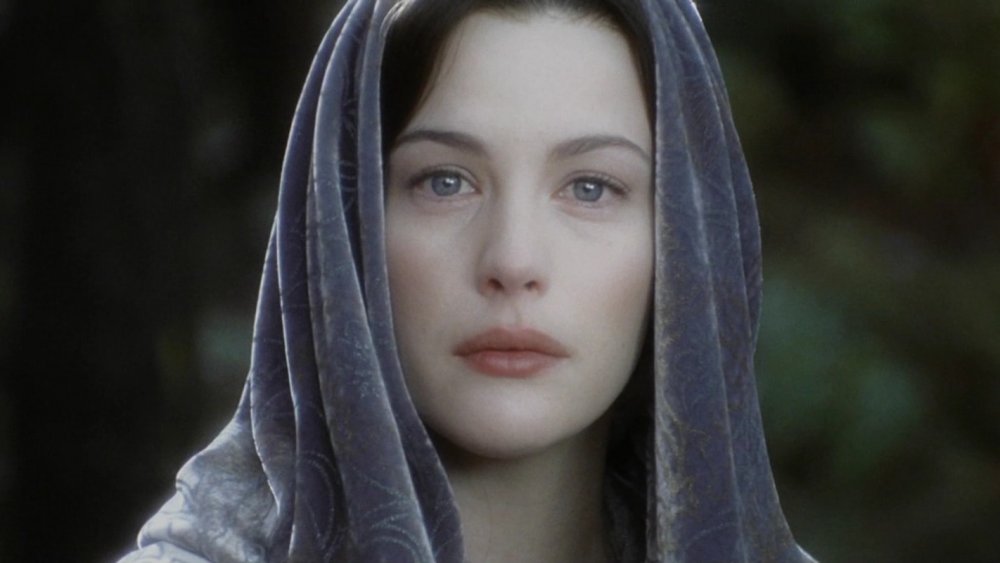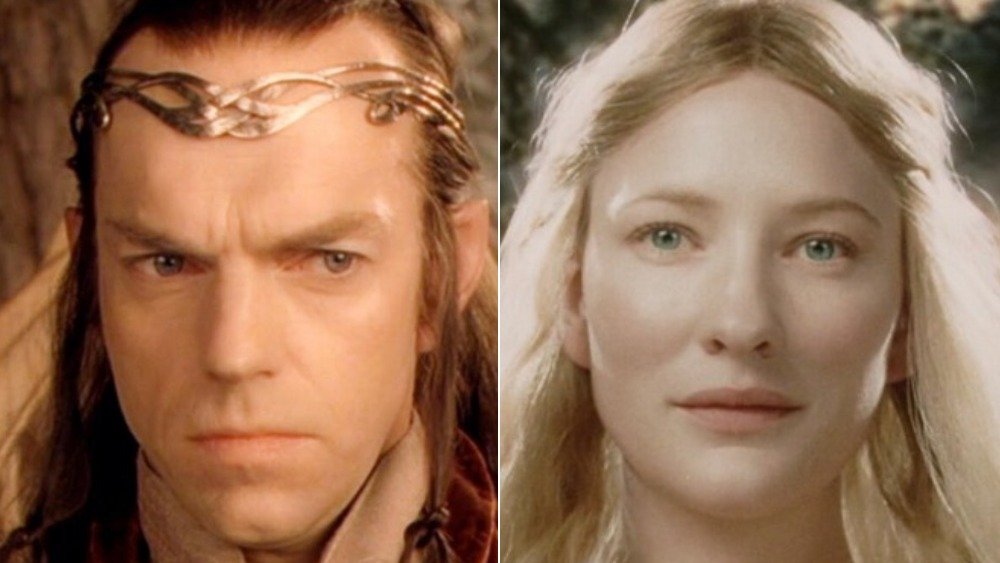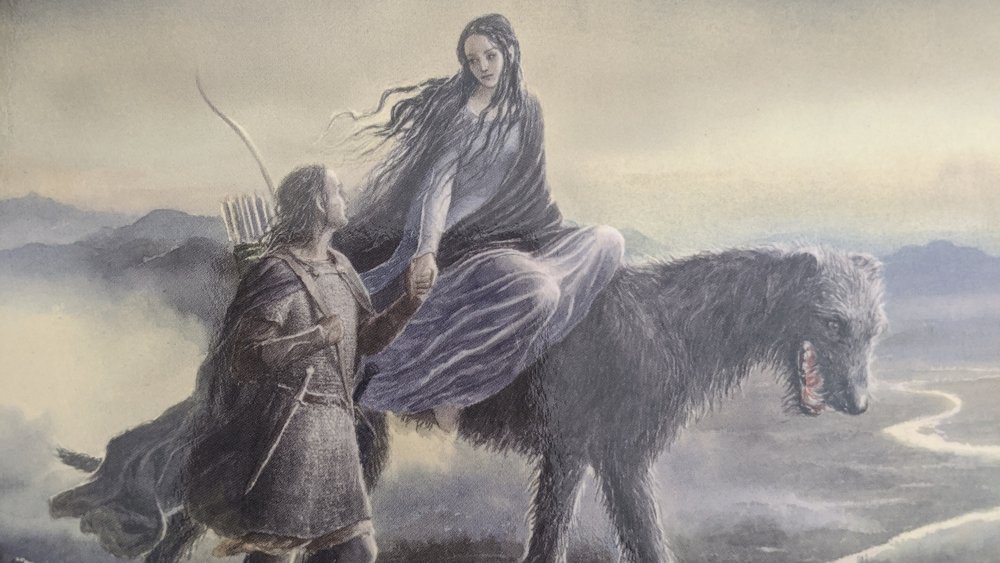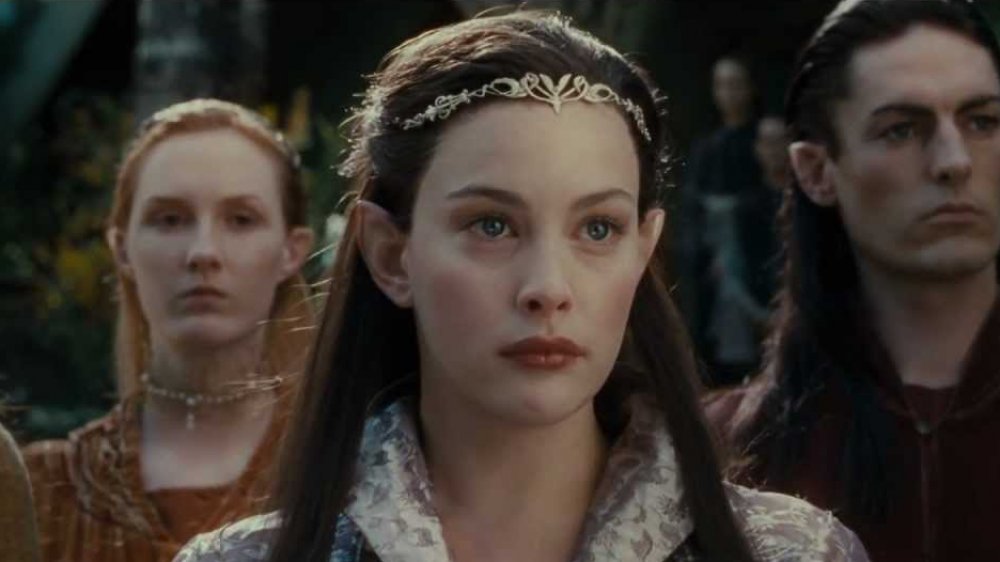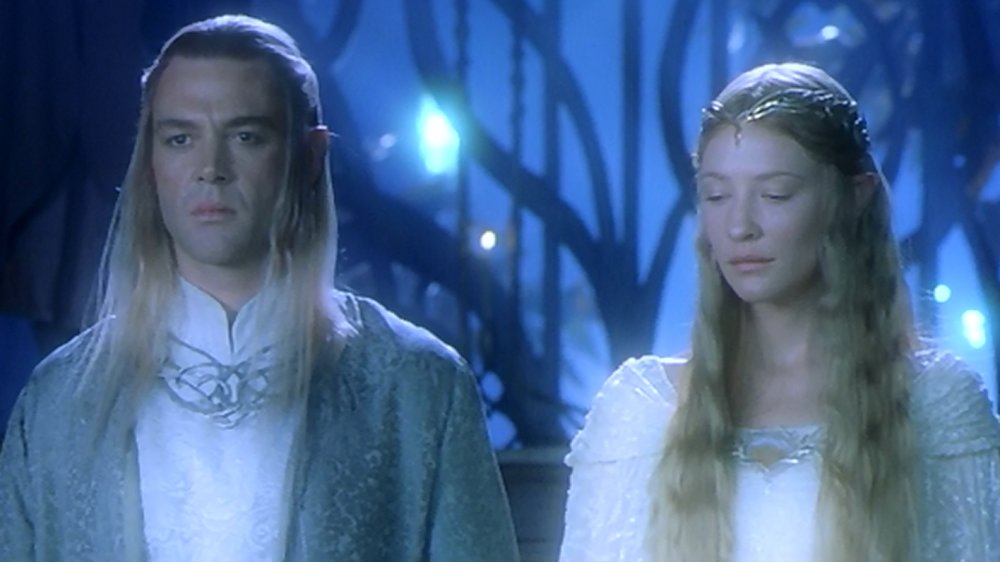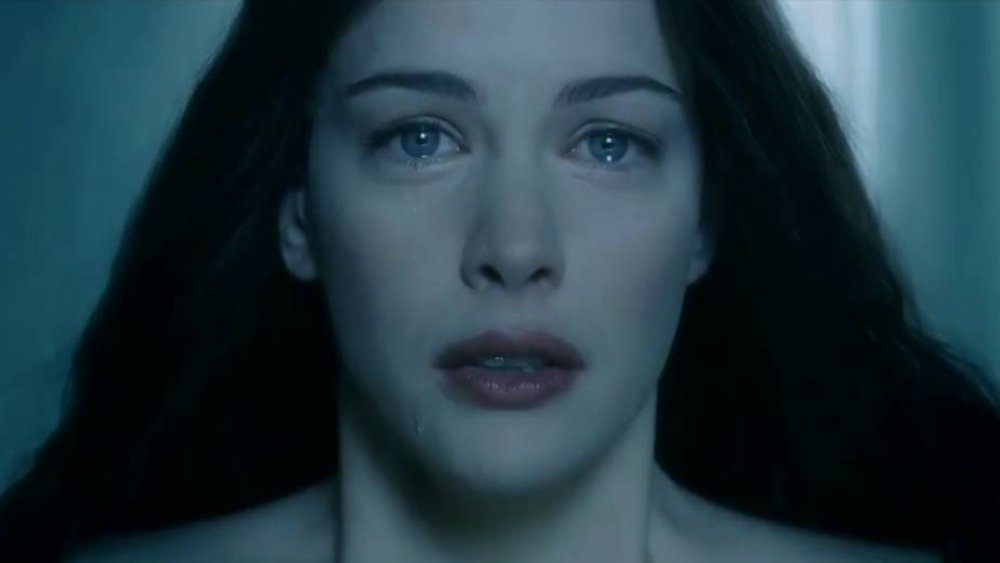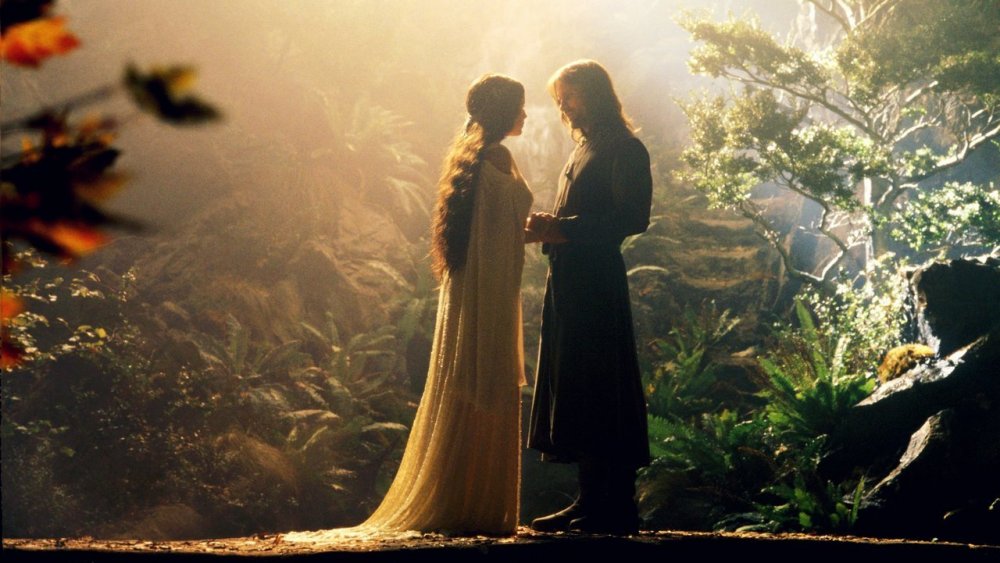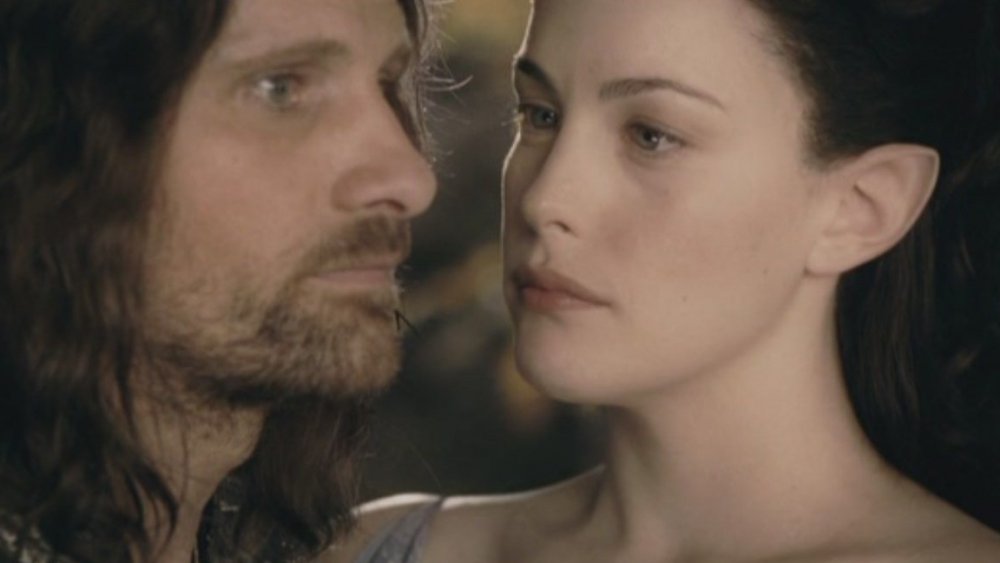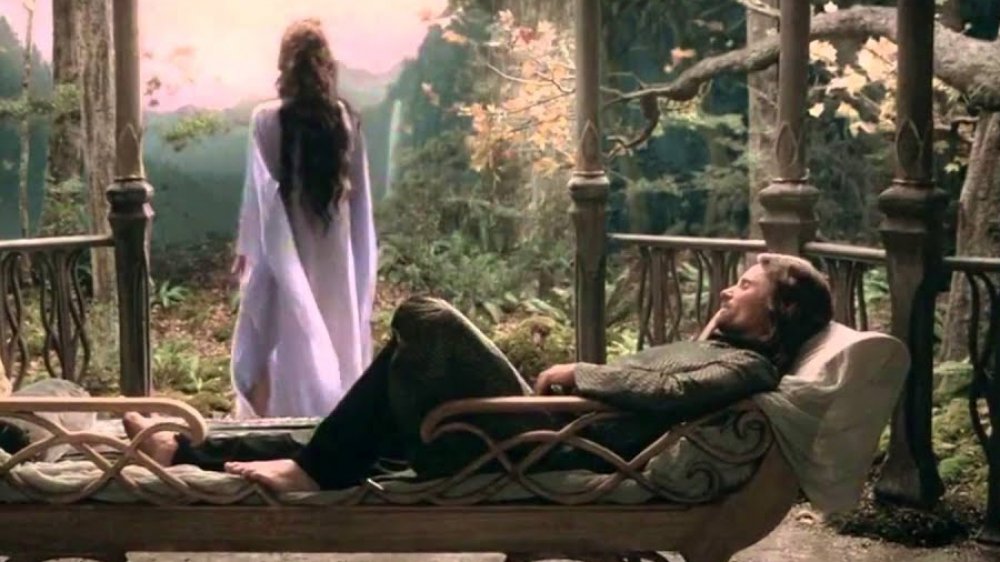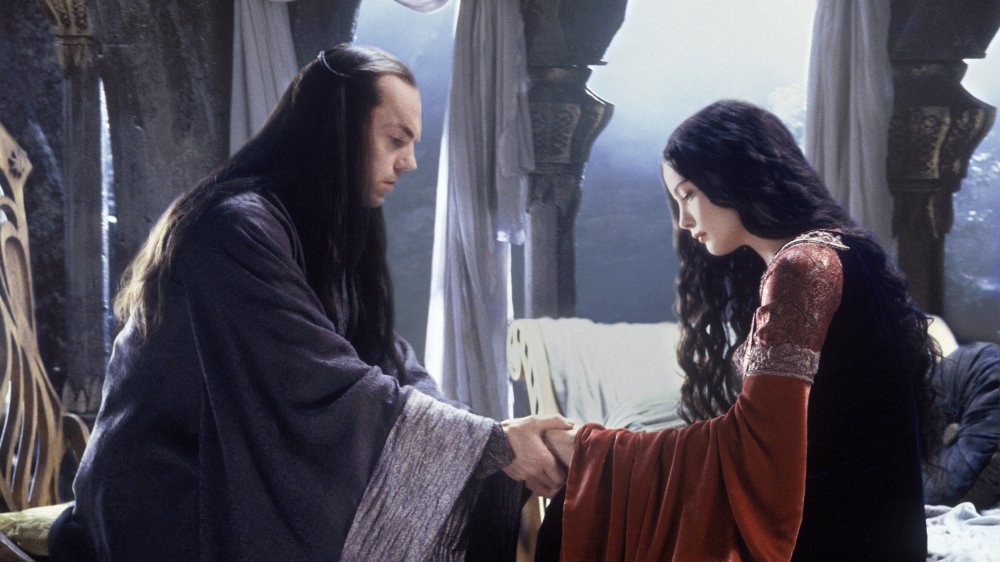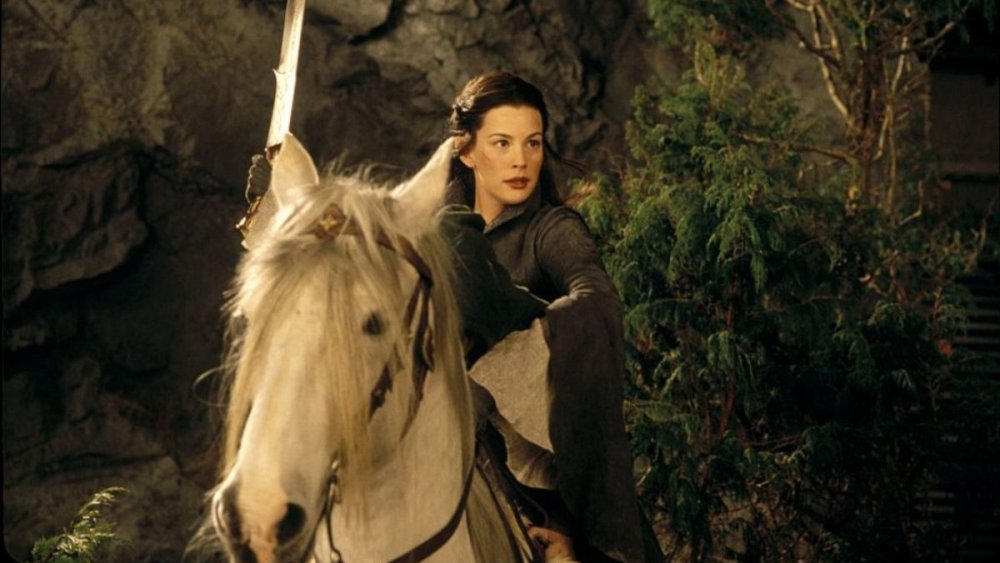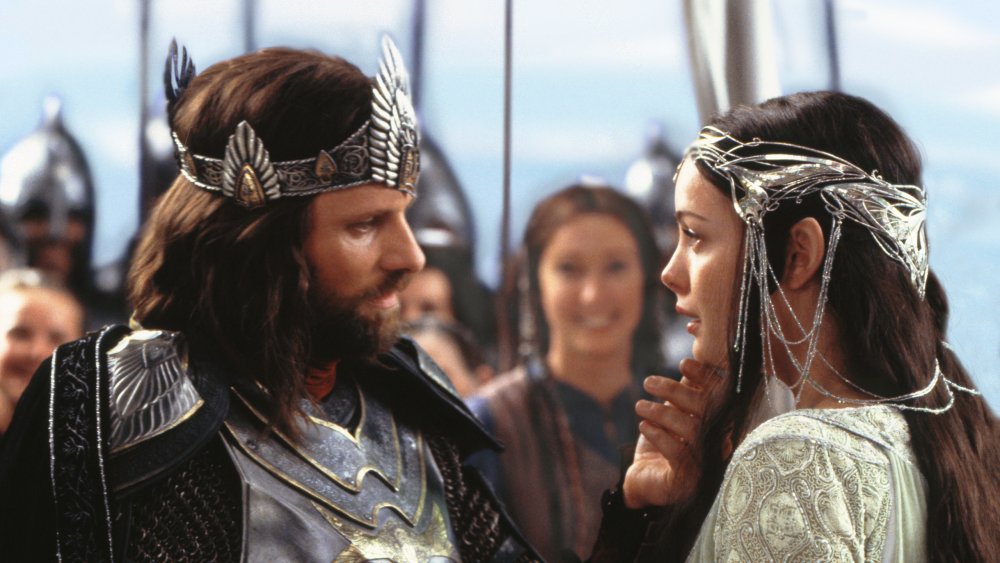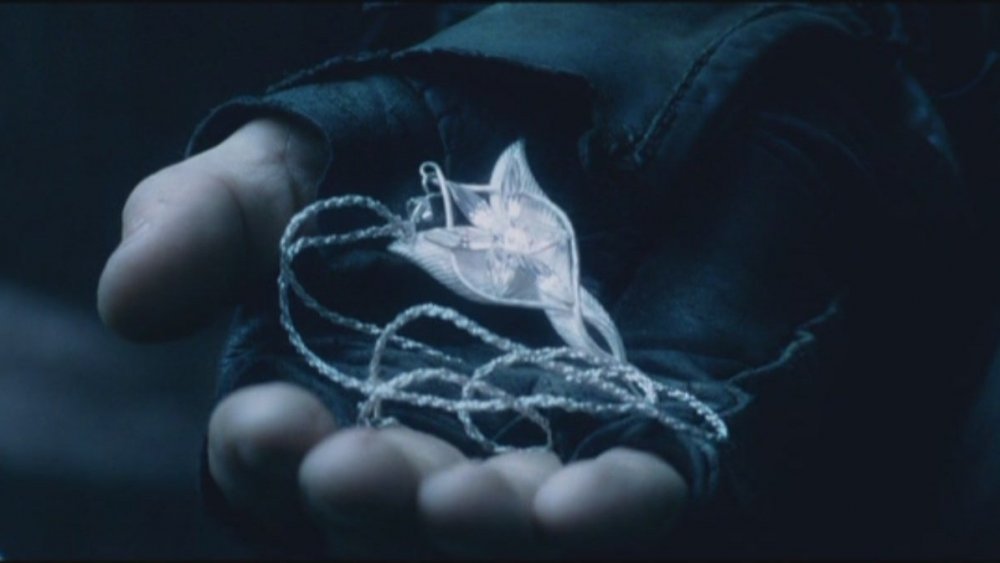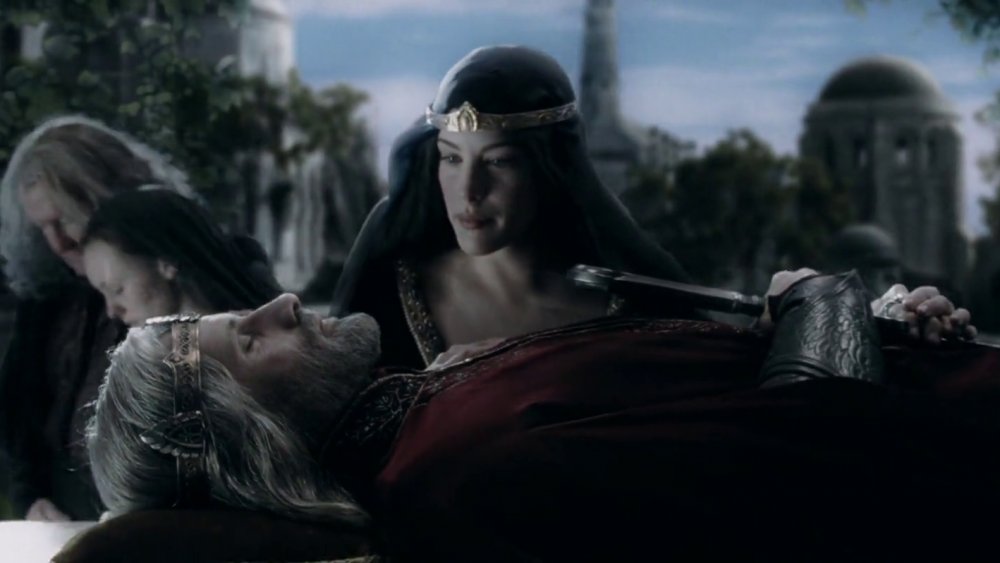Arwen's Entire Backstory Explained
There's little doubt that The Lord of the Rings is a testosterone-filled narrative with bands of brothers, epic battle sequences, and power-hungry men constantly duking it out for control. Nevertheless, every now and then, a female characters manages to rise to the surface, and when they do, they stand out.
Galadriel is an incredible elf-maiden who's thousands of years old, rules over multiple realms, and creates the White Council that stops the Necromancer. Éowyn rises from anonymity by defying her king and riding to battle unannounced, where she shows her indomitable spirit by dispatching the Witch-king. The feat, which is already badass enough, is all the more impressive since the chief of the Black Riders has a prophetic reputation for being unkillable — by men, at least.
And then there's Arwen Undómiel (also known as Arwen Evenstar). Immortal being, daughter of Elrond, wife of Aragorn, and queen of Gondor, when you add it all up, the elf-maiden has one of the most impressive rap sheets in all of Middle-earth. Her story does vary a bit between the books and their on-screen adaptations, though, and we'll address that as we go along. But nevertheless, we've dug into her history and presented it below for your reading pleasure. So without further ado, here's Arwen's entire backstory explained.
Arwen's famous family
Ancestry is often a key part of what defines a person's path in life, and with Arwen, it's essential. Right from birth, her lineage, both in the recent and distant past, makes her a prime candidate for the Middle-earth limelight. Let's start with the familiar faces first.
Arwen's dad is Elrond. As the leader of Rivendell, a venerable warrior, and a famous counselor, Arwen's father is practically always at the center of the continent's politics and wars, and his daughter is often by his side in Rivendell, observing the action. And then there's Arwen's maternal grandmother, Galadriel. The Lady of the Golden Wood is about as old an elf can get, and she's witnessed nearly all of Middle-earth's long, dramatic history. She has incredible power, wields an elven ring, and is one of Sauron's chief enemies. Over the course of her life, Arwen will spend a good amount of time living with her impressive grandmother, doubtlessly gleaning life lessons and learning how to survive as a strong elf-woman among so many power-hungry elves and men.
Arwen's lineage is impressive, too
While having Galadriel and Elrond as her family members is already enough to set Arwen up as a pretty important she-elf, the hereditary connections don't stop there. Even when you look beyond the immediate relatives, Arwen's family history is studded with famous people, particularly through her father. Elrond's father is Eärendil the Mariner, the half-elf, half-man hero that saves the good guys from destruction at the end of the First Age of Middle-earth history. On top of that, Elrond's mother is Elwing, the granddaughter of the man Beren and the half-elven, half-angelic Lúthien, the power couple in one of Tolkien's most famous First Age epics.
And the thing is, we're only touching on the most famous of her relatives here. There are several others who play critical roles in Tolkien's other writings, especially The Silmarillion. Suffice it to say, Arwen is the Middle-earth equivalent of the offspring of a marriage between a rockstar and a Hollywood celebrity. She's got fame, fortune, and political power surrounding her on all sides right from day one. For those of you who didn't notice, she's also descended from men, elves, and the angelic Maiar — that last one is through Lúthien's mother, Melian — giving her and her immediate family a unique connection to all three races.
Arwen is young ... for an elf
According to the appendix of The Return of the King, Arwen is born 241 years into the Third Age. That makes her approximately 2,778 years old by the time the One Ring is destroyed. This isn't terribly old for an elf. In comparison, her grandmother, Galadriel, is over 8,000 years old by then. However, it does give her a solid chunk of experience and means she has a good step up on her future husband's 88-year lifespan.
When Arwen is born, the world is relatively peaceful. A few hundred years before that time, the Second Age wraps up with the epic War of the Last Alliance. That's the event depicted in the opening sequence of The Fellowship of the Ring, where men, elves, and dwarves join together to resist Sauron's first run at conquering the continent. When the dust settles, the Dark Lord is defeated, the Ring has been cut from his hand, and Middle-earth settles down for a long period of relative peace and prosperity.
The primary thing to point out during these early centuries of Arwen's life is the fact that while the power of men grows in Middle-earth, the elves and dwarves slowly begin to fade into obscurity. That's not to say that they're impotent. Places like Lothlórien, Rivendell, and Khazad-dûm are still powerful and influential. However, they stop trending up at this point in time and, if anything, begin to lose the larger political and military power that they once had.
She likes to live with her grandparents
Her people may have been slowly fading, but the first few thousand years of Arwen's life are ones of peaceful comfort. She spends a lot of her time bouncing between Rivendell and Lothlórien. But when we say "bouncing," we're not talking about stopping in on the weekends. As an immortal being, time is no object, and Arwen sets up a nice revolving system where she spends years at a time living in either Rivendell with her nuclear family or in Lothlórien with her grandparents.
In fact, when she first meets Aragorn in Rivendell, which we'll get to in a second, she's just returning from a prolonged stay in Lothlórien. In The Return of the King, she even casually mentions that, "I have dwelt for a time in ... Lothlórien," adding that, "It is many years since I walked in [Rivendell]." While there aren't a ton of details on Arwen's early activity, the bulk of her time for the greater part of 3,000 years seems to have been spent following this pattern of living in one of the two elven havens or traveling between them.
The sad story of Arwen's mother
In addition to her famous father and grandmother, Arwen also has two older twin brothers, Elladan and Elrohir, as well as a mother (Galadriel's daughter) named Celebrían. However, over time, she sees each of these familial connections less often, primarily due to a tragic event that happens to her mother.
At one point, about 500 years before the War of the Ring, tragedy strikes the family when their mother is captured by orcs in the Misty Mountains. She's eventually found and rescued by her sons, but by then, she's been tortured and poisoned. A devastated Elrond manages to save her life, showing a glimpse of the skill that he later uses to save Frodo from his deadly knife wound. However, Celebrían is so traumatized by the experience that she never fully recovers her former health and eventually decides to leave Middle-earth to seek peace and healing in the Blessed Realm (the same place that Frodo and Sam sail to at the end of The Return of the King).
After this experience, Arwen's brothers become especially bitter towards the orcs and spend much of their time out hunting their foes, often teaming up with the Rangers in the process. Eventually, this morbid hobby even leads to their being present when Aragorn's father is killed by orcs, making his young son chieftain in the process. And that serves as the perfect segue to finally introduce Arwen's beau.
That awkward moment when Arwen met Aragorn for the first time
In the year 2951 of the Third Age, Arwen returns to Rivendell from a lengthy trip to visit her grandparents. Soon after she gets back, she decides to take a walk because stoically walking through the woods is just what immortal people do. She walks along the green grass with the white birch trees around her, when who should appear on the path in front of her but a young man, singing as he strolls through the woods. When he sees her, the youth stops and stares, gaping. He'd been singing about the famous elf-maiden Lúthien, and lo and behold, here he thought she'd appeared before his very eyes.
The young man is, of course, Aragorn, son of Arathorn. At this point, he's a 20-year-old stripling who's over the moon because he just found out that he's the chieftain of the Dúnedain and the heir to the throne of Gondor. When the two meet, it's love at first sight — at least for Aragorn. Arwen, who is over 2,700 years old at this point, is little more than amused by his head-over-heels attraction to her beauty.
Nevertheless, Aragorn sets his heart on pursuing the elvish maiden, which quickly leads to a gentle but stern confrontation with Elrond. The loremaster sadly prophesies to the young Ranger that Arwen will only marry him if he becomes king, and that in either case, either he or Aragorn will eventually be heartbroken by the situation.
Yes, Arwen is distantly related to Aragorn
The budding relationship between Arwen and Aragorn brings up an interesting question ... are the two related? The short answer is, well, yes. In fact, in The Return of the King, when we learn how they met and Aragorn explains who he is, Arwen's immediate response is that, "We are akin from afar." However, while their bloodlines are related, it's definitely a very, very distant connection. Elrond's brother is a man — literally a man — named Elros. With their unique family history, the brothers and their descendants are allowed to choose between either an immortal or a mortal life.
While Elrond chooses immortality, his brother opts for mortality and ends up leading a nation of men called Númenor. Over time, that nation becomes one of Sauron's chief enemies, and eventually, it's the Númenóreans who set up the two kingdoms of Arnor and Gondor. When Arnor collapses, its royal bloodline secretly survives through the Dúnedain (that is, the Rangers) and their line of chieftains, the last of whom is Aragorn.
In other words, there are dozens of generations between Arwen and Aragorn, making them technically but extremely distantly related. Considering the fact that Tolkien came from a world where English royalty was constantly intermarrying with first and second cousins, the magnitude of the distance in Aragorn and Arwen's relationship would hardly have seemed to be much of a concern.
How she fell in love with Aragorn
Arwen's first reaction to Aragorn's affections is humorous. She's likely tickled by the adoration but hardly considers this youthful man to be anything but an admirer. Over time, though, Aragorn makes his case in a convincing yet indirect way. When he discovers that he doesn't have a shot with Elrond's daughter at present, the Ranger leaves Rivendell and heads out into the wide world to forge his own path.
In the ensuing decades, the exiled king proves himself over and over again. He travels in the wild, fights in disguise in Rohan and Gondor, befriends Gandalf, and even makes a solo trip far into the mysterious eastern and southern regions of the continent.
Over this time, the son of Arathorn evolves from an inexperienced young man to a battle-hardened warrior. He gains wisdom and experience beyond his years — years that quickly add up. While still a drop in the bucket, the next time he meets Arwen, Aragorn is around 50 years old. This time, they hook up in Lothlórien, and it's Arwen who's surprised to see Aragorn walking towards her through the trees. They spend a season together, and Arwen officially falls in love with the now-mature exiled king. By the time they part ways, they've committed to marrying each other, and Elrond gives his sad approval, though he clarifies that his daughter will marry no one less than the king of Arnor and Gondor.
Arwen's role in the War of the Ring (book edition)
After she officially betroths herself to Aragorn, Arwen spends most of the next few decades in Rivendell as things ramp up to the War of the Ring. Once the war breaks out, her role varies depending on if you're reading the books or watching the movies. Let's start with the books.
In Tolkien's original trilogy, Arwen remains more or less on the sidelines throughout the series. However, just because she's out of sight doesn't mean she's out of mind. In fact, Aragorn is depicted thinking of her on multiple occasions. For instance, when the Fellowship of the Ring arrives in Lothlórien, Frodo sees the Ranger "wrapped in some fair memory" in the same place where he and Arwen got engaged.
In addition to remembrances, Arwen actively impacts the plot more than once. She meets with Aragorn when he arrives with the hobbits in Rivendell. She also personally makes a great banner — black with mithril, gold, and gems — that displays the Seven Stars, the Crown of Gondor, and the White Tree. Aragorn unveils this banner during the Battle of Pelennor Fields, using it to officially announce his return as the king.
Arwen's role in the War of the Ring (movie edition)
As one of the primary female characters in the narrative, Arwen's role was dramatically beefed up for Peter Jackson's trilogy. The she-elf helps Frodo escape from the Black Riders, revives a waterlogged Aragorn via a vision, and is repeatedly shown struggling with her father's desire for her to leave Middle-earth rather than become mortal.
Even in this enhanced role, though, Arwen's participation in the plot is actually reduced from the original cinematic scripts. In an interview with IGN, Liv Tyler herself clarified that the character was supposed to be much more heavily involved in the story. There are even scenes in The Two Towers where she can be glimpsed fighting in the background.
However, as they shot the movie, the filmmakers realized that inserting Arwen into the violent action wasn't doing justice to her character. Tyler herself points out that, "You don't have to put a sword in a woman's hand to make her seem a tough. That's little actual makeup of who Arwen is, and her sheer will and strength and love for this man was strong enough." Whether she had been depicted in battle or not, though, there's no doubt that Arwen is more present in the film adaptations than she ever is in the original The Lord of the Rings story.
How she became a queen
After the War of the Ring, both the written and cinematic versions of Arwen's story reconnect when she marries Aragorn. In all of the annals of Middle-earth lore, this becomes just the third time that an elf and a man get hitched, with both of the previous unions also taking place in their shared family tree. Their nuptials are a high-water mark in the story of the two lovers.
Of course, Arwen's marriage also means she officially becomes the queen of the reunited realms of Gondor and Arnor. Practically overnight, this makes her the most powerful woman in all of Middle-earth. As queen, she helps Aragorn rule their kingdom for a 120 years. During that time, she brings Sam Gamgee's daughter, Elanor, to be her maid of honor in Minas Tirith. She also has at least two daughters, who remain nameless, and a son named Eldarion who eventually succeeds his father to the throne.
Arwen's ability to choose her fate
One of the most complicated and confusing elements about Arwen's life is her mortality — or more accurately, her immortality that is replaced by mortality. While the entire "half-elven" schtick is extremely confusing, in essence, Arwen is allowed to choose between being immortal or mortal since she has both elves and men in her ancestry. Each of the three unions between elves and men provide offspring that are referred to as the "half-elven."
In general, these descendants are given the choice of whether they remain immortal or become mortal. However, the specific ground rules for this choice are never clarified by Tolkien. It would appear that, at least, once someone chooses to be mortal, the choice isn't given to their children.
Regardless of the specifics, as the daughter of the immortal Elrond, Arwen lives as an immortal elf until she gives up her immortality to marry Aragorn. This enables her to grant Frodo her spot on the ship headed west to the Blessed Realm, but it also sets her up for a painfully difficult parting, as well.
Arwen's sorrowful death
When Arwen discusses her choice to become mortal in The Return of the King, she explains that she has chosen "both the sweet and the bitter," and 120 years after her marriage to Aragorn, the "bitter" part really comes home to roost. In fact, when Aragorn is dying, Arwen's last words to him are that death is "bitter to receive." After he passes and Eldarion becomes king, it says that "the light of her eyes was quenched, and ... she had become cold and grey as nightfall in winter that comes without a star." Dark words for a being whose nickname was literally "Evenstar."
In her sorrow, she says goodbye to her children and her loved ones, and then she leaves Minas Tirith, returning to her past home of Lothlórien. However, by this time, Galadriel and her people have left, and no elves remain in the Golden Wood. She wanders there through the following winter and then finally lies down to rest in the same place where she had betrothed herself to Aragorn so many years before. There, tasting the bitterness at the very end of her mortal life, she passes away quietly, eventually surrounded by a green grave that will never change until the world itself is altered.
